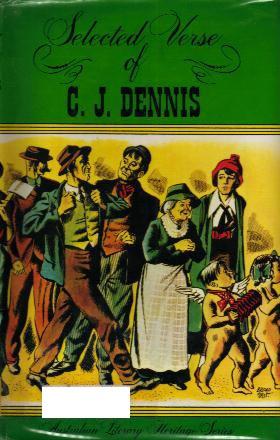
|
Selected Verse of C.J. Dennis Chosen and introduced by Alec H Chisholm 1950 |
|
Dustjacket synopsis: "The selection has been made, and is introduced, by Dennis' biographer, Alec H. Chisholm. Mr Chisholm has aimed at achieving a truly representative selection, one which displays Dennis' versatility as well as his skill. "Dennis is, of course, best known as the author of The Sentimental Bloke, the master of 'slanguage'. He also wrote, however, as well as other vernacular verse tales, bush ballads, the lilting fantasy The Glugs of Gosh, and many merry and melodious verses for children. Examples of all these are included here. "Selected Verse of C.J. Dennis is a thoroughly entertaining volume, the poet's verses occasionally complemented by an original Hal Gye illustration. Those readers already familiar with Dennis' verse will regain the joy of former readings; new readers will be captivated by its robust humour, human tenderness and extraordinary skill in rhyming." Contents:
Introduction First Paragraph from the Introduction: Was there ever an autobiography, in fact or fiction, prose or verse, that opened in more forthright fashion than does the tale of Australia's Sentimental Bloke, as presented by C. J. Dennis:
The world 'as got me snouted jist a treat;
Crool Forchin's dirty left 'as smote me soul;
An' all them joys o' life I 'eld so sweet
Is up the pole!
The Bloke - known also as the Kid and Bill - was obviously at odds with the whole universe when he made that poignant complaint. But, of course, his condition was no novelty. Many a man before him had developed a fervent grouch against the world at large. Similar feelings had been expressed, for example, by another "Bill" of a much earlier day - one surnamed Shakespeare:
When in disgrace with fortune and men's eyes I all alone beweep my outcast state, And trouble deaf heaven with my bootless cries, And look upon myself, and curse my fate. If the language of the Shakespearian sonnet is rather more chaste than that of the Dennis song, the two expressions are impressively alike in substance. (They bear in fact the same relationship as do Hamlet's claim, "There's a divinity that shapes our ends", and the Bloke's crisp remark, "It's 'ow Gawd builds a bloke".) They are, moreover, alike in having a flavour of factual autobiography. That is to say, Dennis himself was in trouble with "Forchin's dirty left" just as often as Shakespeare was "in disgrace with fortune and men's eyes", and, no doubt, he found relief at times, as Shakespeare apparently did, in causing his spirit to "rail on Lady Fortune in good terms" - if only to prove that the clouds were usually followed by sunshine. From the Angus and Robertson hardback edition, 1975. |